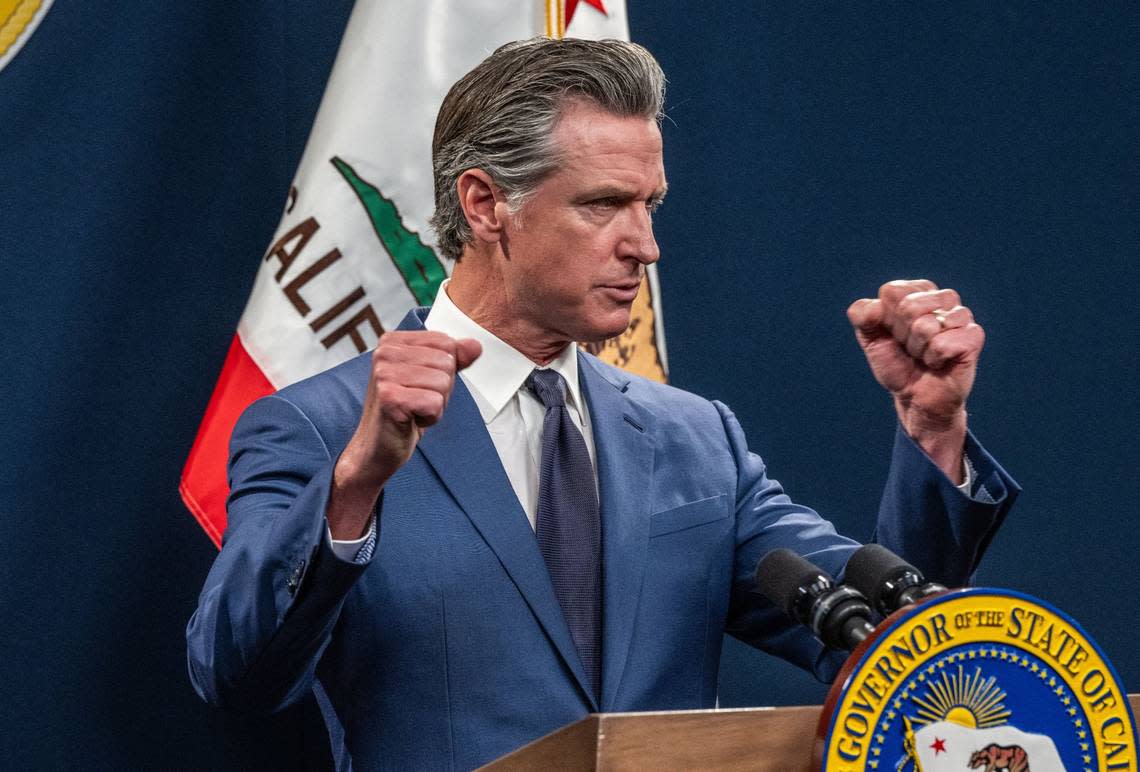Gavin Newsom is on political defense. Why it’s pushing him to do a video State of the State

- Oops!Something went wrong.Please try again later.
California Gov. Gavin Newsom on Tuesday will share an unusual State of the State message, but it won’t involve an in-person speech or answering questions about his policy priorities.
The governor will instead release a prepared video message, sent in written form to lawmakers, and hold a private reception with the Legislature.
Political consultants said it’s a strange political maneuver at a time when Newsom is fighting several battles and could use the opportunity to commune with lawmakers and assert himself on any number of issues.
“It was a few months of delay of game and and now it’s almost an afterthought,” said Steve Maviglio, a Democratic political consultant. “And it’s too bad, because it’s a real opportunity for him to engage with the Legislature and put forth what his ideas are. This year he’s been playing defense, and I think that’s reflected in the way he’s handling the State of the State.”
Newsom has postponed the speech since March, when he was originally supposed to deliver it in the Capitol before the close Proposition 1 vote prompted him to push it back.
His team said the move to do a recorded speech has to do with scheduling — never mind that the governor could likely find a way to deliver remarks about the health of California at a place and time of his choosing, if he so desired.
Newsom’s political troubles
Newsom is facing difficulties on a few different fronts.
The governor and legislative leaders announced an agreement on a $297.9 billion budget during the weekend, but he acceded to lawmakers on some significant cuts and spending items.
Assembly Speaker Robert Rivas, D-Hollister, and Senate President Pro Tem Mike McGuire, D-Healdsburg, were able to secure $1 billion for another round of homelessness grants, slice prison funding by $750 million and restore money for housing and social safety net programs that Newsom wanted to cut.
The leaders got a lot of what they wanted at a time when the state is facing an estimated deficit of $45 billion. The budget is meant to close a $47 billion shortfall.
Newsom hasn’t dealt with the challenging budget processes state leaders saw in decades past, due to a Democratic supermajority in the Legislature and rule changes that allow lawmakers to more easily pass spending plans.
Working out a spending plan in a time of deficit, though, hardly attracts positive media coverage, said Andrew Acosta, a Democratic political consultant.
“There’s a lot of sort of negative headlines about the budget,” Acosta said. “It’s not hunky dory. We’re not throwing money in a bunch of programs. Now we’re having to trim back and delay. And so it’s harder for the governor to claim some credit for things when not all of the news coming out Sacramento is great.”
At the same time, the governor, Rivas and McGuire are struggling to get proponents of an initiative changing portions of Proposition 47 to remove it from the November ballot ahead of a Thursday deadline.
Newsom since January has been clear he does not want to alter the 2014 voter-approved measure, which made certain theft and drug crimes misdemeanors and set a $950 threshold for shoplifting.
The governor, Rivas and McGuire have been pushing their alternative to the initiative, a package of bills that would toughen penalties for retail theft crimes, but not in a way that would require voters to roll back parts of Proposition 47, the 2014 ballot measure that created the current system.
The leaders have attempted to back ballot measure proponents into a corner by making changes to some of the bills voiding the legislation if the initiative passes. So far, this has only divided Democrats and enraged the Republicans who previously supported the bills.
Last week, Newsom’s administration was embarrassed by a CBS 13 story that revealed leaked emails between chief of staff Dana Williamson and Greg Totten of the California District Attorneys Association, the 2024 ballot measure’s strongest backer.
The emails showed Williamson playing hardball with Totten, saying the administration wouldn’t engage with the district attorneys unless they agreed to move the initiative to the 2026 midterm election ballot.
It’s unclear whether Newsom will mention the retail theft issue in Tuesday’s address.
Is the speech a big deal?
Does the State of the State even matter to most Californians?
“If somebody wants to criticize the governor, they can find something to criticize him on,” Acosta said. “I don’t think average people are waiting around to see what the State of the State is. It’s probably not top of mind for most people that he hasn’t done it and that not doing it the quote, unquote ‘traditional way’ really means anything.”
Maviglio still sees some value in giving a speech, even though, he said, Newsom has never been fond of traditional podium-style moments.
“There’s some things you ought to do when you’re governor,” he said. “And that’s address the legislature, address the people. Lay out your priorities. I mean, it’s our equivalent to the State of the Union. It’s an opportunity to grab headlines and roll out things.”
Both agree that it has given Republicans — who have been attacking him about the lack of a speech for months — more of a chance to attack him.
“Maybe it’s like, ‘Okay, the Republicans beat me over the head about this for three months. I’m just going to be nonchalant about it and say was never a big deal,’” Maviglio said.


